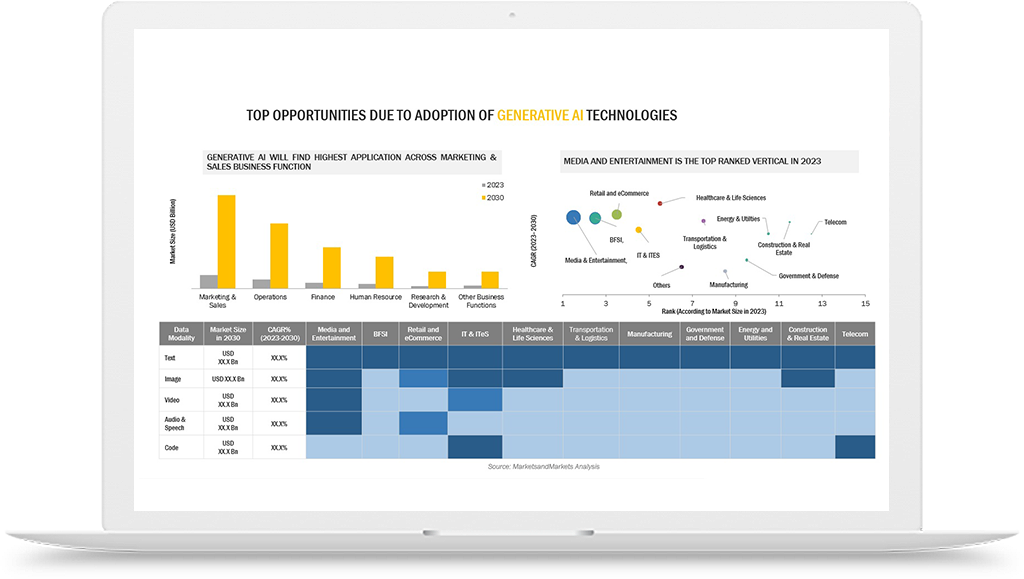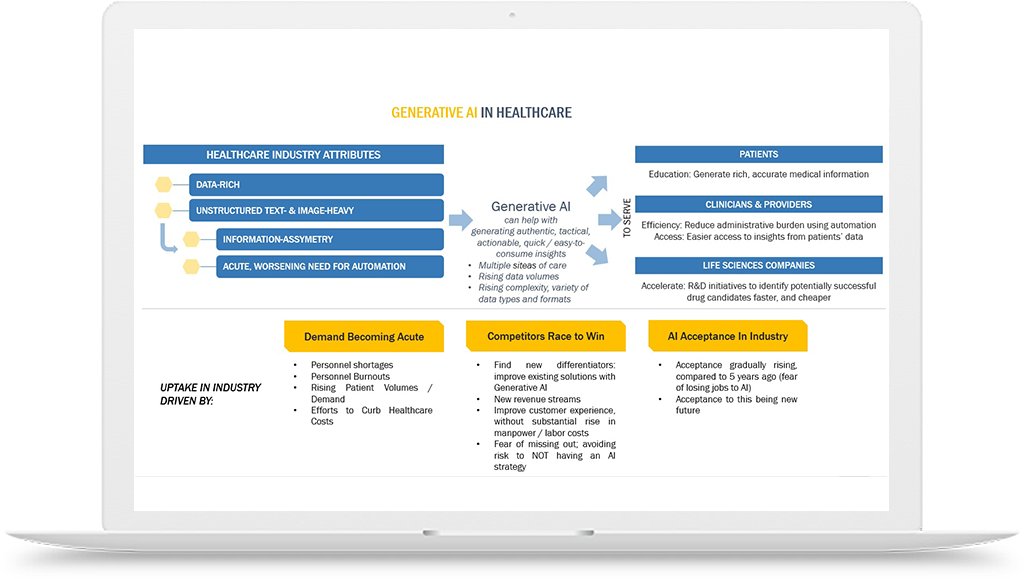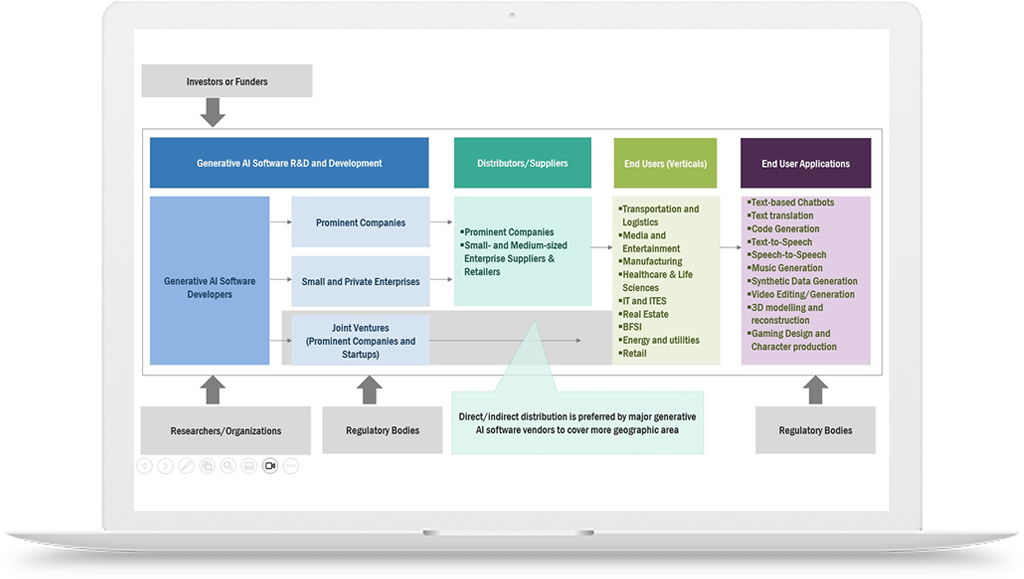Generative AI in Marketing
Top 5 Growth Opportunities of Generative AI in Marketing
How is Generative AI Revolutionizing the Marketing Industry, and What Are the Top 5 Growth Opportunities?
- Which are the top-growing use cases of Generative AI in Marketing?
- Which start-ups are attractive targets for your needs?
- Who are the leading players?
- Which are their most demanding marketing technology application areas?
- What is their revenue potential?
Top Ranked Verticals in Generative AI Economy

Read More..
The role of AI in marketing cannot be overstated. With the exponential growth of digital channels and the ever-increasing demands for personalized, engaging content, marketers are turning to AI as a strategic ally. AI-driven marketing solutions are capable of processing immense amounts of data, identifying patterns, and predicting customer behavior with incredible accuracy. This empowers marketers to deliver the right message to the right audience at the right time, a critical success factor in today's competitive marketplace.
Of course, integrating new technologies brings challenges in skill-building, ethics and governance. But enterprises able to leverage generative AI in marketing can connect with customers in remarkably efficient and impactful new ways. 2023 marks an inflection point where early adopters stand to Gain an edge on the competition.
The key is developing thoughtful strategies, use cases and governance around these rapidly evolving new tools. There has never been a more exciting time to evolve enterprise marketing with AI.
Importance Generative AI in Marketing
For a number of reasons, generative AI is very important in marketing because it can improve marketing strategies and Campaigns in a number of ways. The following are some significant applications of generative AI in marketing.
- Content Generation at Scale:
Generative AI is very good at creating large amounts of high-quality content fast. With little assistance from a human, it can produce product descriptions, blog posts, and social media updates. This implies that without hiring a horde of content producers, marketers can continue to provide a steady stream of content for a variety of platforms. It's an effective technique for Maintaining viewers' interest and knowledge
The potential of Generative AI to produce highly personalized content is one of its biggest marketing advantages. AI is able to comprehend individual preferences, behaviors, and purchase histories through the analysis of large amounts of data. With the use of this information, marketers can better target particular client segments with their messaging, making their Campaigns more relevant and ultimately increasing conversion rates.
Email marketing remains a cornerstone of digital marketing strategies, and Generative AI is taking it to the next level. AI-powered systems can craft personalized Email content and subject lines that resonate with each recipient. This level of customization increases open rates and engagement, resulting in more successful Email Campaigns.
Images and videos are examples of visual content, and they are essential to modern marketing. Visuals that complement Campaign goals and brand aesthetics can be produced by generative AI. This ability is particularly useful for producing visually appealing website graphics, ads, and social media posts.
- Personalization and Customer Segmentation:
- Enhanced Email Marketing:
-
Visual Content Creation:
- Data-Driven Decision-Making:
In addition to producing content, generative AI offers insightful data. Artificial Intelligence (AI) can recognize patterns, forecast consumer behavior, and suggest marketing tactics by examining data from multiple sources. With this data-driven strategy, marketers are able to make well-informed decisions and instantly modify their approaches.
Generative AI in advertising
Generative artificial intelligence (AI) represents an extraordinary advance for marketers. Instead of just analyzing data, these AI systems can create entirely new content and insights, opening exciting possibilities for businesses to connect with customers. Two emerging applications stand out - automated content generation and hyper-personalization.
On the content front, tools like Copy.AI and Phrase enable marketers to auto-generate a myriad of materials from blog posts to social captions tailored to brand voice and audience interests. This allows rapid testing and refinement of messaging. Brands like Made.com successfully employ generative AI for product descriptions at scale.
The way advertisements are made, optimized, and distributed is being revolutionized by generative AI, which has many uses in the advertising industry.
Application of generative AI in advertising
Generative AI in advertising offers a wide range of applications, transforming the way marketers create, optimize, and deliver advertisements. Here are some specific applications of generative AI in advertising.
- Content Generation:
Blog Posts: With the use of generative AI, marketers can easily produce blog posts on a range of subjects on a regular basis.
Social Media Posts: AI can be used by marketers to produce relevant and interesting social media content for websites like Instagram, Twitter, and Facebook.
Product Descriptions: AI can create distinctive and captivating product descriptions, improving the attractiveness of goods on e-commerce platforms.
- Email Marketing:
Personalized Email Content: Email recipients' preferences and behavior can be used by generative AI to personalize content, increasing open and click-through rates.
A/B Testing: AI can recommend A/B testing iterations for subject lines, email copy, and images to maximize the effectiveness of email campaigns.
- Ad Copywriting:
Compelling Ad Copy: Advertising campaigns can be made more effective by using generative AI to create copy that appeals to the target audience.
Dynamic Ads: Ad relevance can be increased by using AI-powered systems to generate dynamic advertisements that automatically modify content in response to user interactions or real-time data.
- Visual Content:
Image and Video Generation: AI can save time and money by producing photos and videos for marketing materials like advertisements, social media posts, and product demos.
Customized Graphics: AI can be used by marketers to create unique charts, infographics, and graphics to support their content and improve visual storytelling.
- Chatbots and Conversational Marketing:
AI Chatbots: Chatbots that can converse with clients in real time, respond to their inquiries, and assist them with the purchasing process are created using generative AI.
Conversational Marketing: Artificial intelligence (AI)-powered chatbots can collect consumer feedback and make tailored product recommendations, which can enhance marketing tactics.
Generative AI marketing use cases
Generative AI marketing use cases is applied across various marketing use cases to automate tasks, enhance personalization, and optimize strategies.
Benefits of Using Generative AI marketing use cases
Generative Artificial Intelligence (Generative AI) is a powerful tool that offers numerous advantages to marketers seeking to improve their strategies and drive better results. Here are some of the key benefits of incorporating Generative AI into your marketing efforts:
- Improved Efficiency:
Time-consuming processes, like content creation and optimization, can be automated with generative AI. This increases overall efficiency by freeing up marketing teams to concentrate on higher-level tasks, creativity, and strategic planning.
- Cost Savings:
Businesses can lessen their dependency on outside content creators and eventually save money by automating content creation and personalization. AI can also maximize advertising spend by precisely targeting the right audience, which lowers the cost of marketing budgets.
- Enhanced Personalization:
Large volumes of data can be analyzed by generative AI to produce highly personalized content. Customers respond well to this degree of personalization, which boosts engagement, enhances customer loyalty, and increases conversion rates.
- Consistency in Brand Messaging:
AI keeps a consistent and polished brand image by making sure that style guidelines and brand messaging are followed consistently in all marketing materials.
- Data-Driven Decision-Making:
By analyzing data, generative AI not only creates content but also offers insightful analysis. These insights can help marketers make data-driven choices, improve the effectiveness of their campaigns, and hone their strategies.
Generative AI marketing analytics
Although implementing generative artificial intelligence (generative AI) has many advantages for marketers, there are a number of issues and concerns that need to be carefully considered:
- Data Privacy and Ethics:
- Data Privacy: Large volumes of customer data must frequently be accessed in order to use AI in marketing. Ensuring the confidentiality and integrity of this data is essential for adhering to data protection laws (such as the CCPA and GDPR).
- Ethical Concerns: Content produced by AI should follow moral guidelines. Marketers need to exercise caution when creating content that is inappropriate or misleading.
- Quality Control and Review:
- Content Accuracy: AI-generated content occasionally might not have the same depth of understanding as human content. Marketers must check and verify the accuracy of content produced by AI.
- Brand Consistency: While AI helps maintain brand consistency, it's crucial to review content to ensure it aligns with brand values and messaging.
- Integration with Existing Systems:
- Technical Integration: Integrating AI systems into existing marketing infrastructure can be complex and require technical expertise. Compatibility issues must be addressed.
- Change Management: Workers may require training to become accustomed to new AI-driven workflows, and change resistance needs to be skillfully handled.
- AI Bias and Fairness:
- Bias in Data: Biased content or decisions may result from AI models inheriting biases from training data. Marketers need to recognize and counteract these prejudices.
- Fairness: It is crucial to guarantee the impartiality and fairness of AI-generated content, especially in delicate domains like customer segmentation and advertising.
- Regulatory Compliance:
Generative AI marketing analytics empowers marketers with advanced tools for data analysis, optimization, and personalized insights, ultimately improving the effectiveness of marketing strategies and campaigns.
Generative AI enterprise marketing:
Generative AI enterprise marketing refers to the application of artificial intelligence technologies, particularly generative models, to enhance and automate various aspects of marketing within a business-to-business (B2B) or large-scale organizational context.
Tools and Platforms for Generative AI enterprise marketing:
The application of Generative Artificial Intelligence (Generative AI) in marketing has resulted in the creation of numerous tools and platforms that enable marketers to take advantage of AI's potential for personalization, optimization, and content creation. The following are a few well-liked resources and platforms in the field:
Future Trends in Generative AI and Marketing
The intersection of Generative Artificial Intelligence (Generative AI) and marketing is a dynamic space that continues to evolve rapidly. To stay ahead in this ever-changing landscape, marketers should keep an eye on emerging trends and technologies. Here are some future trends to watch for in Generative AI and marketing:
Even more personalization will be made possible by AI, resulting in content that is highly customized to each customer's preferences, behaviors, and needs in addition to being relevant.
Chatbots and virtual assistants, which are examples of conversational AI, will advance in sophistication and become able to hold meaningful, human-like conversations with clients, improving customer relations and increasing sales conversions.
Artificial intelligence is expected to become more prevalent in producing superior images, films, and animations for promotional campaigns, thereby decreasing the necessity for expensive and labor-intensive graphic design and video production.
Voice-activated devices and virtual assistants, such as Siri and Alexa, are becoming more and more common. As a result, marketers will need to optimize their content for voice search and use AI-driven strategies to improve accessibility and visibility.
AI will enable more sophisticated predictive analytics, assisting marketers in foreseeing the preferences and actions of their target audience. It will also help with strategy development by revealing deeper insights from customer data.
- Advertising Regulations: The legal requirements that advertisers must follow regarding advertising are jurisdiction-specific and change. Ad content produced by AI should abide by these rules.
-
Transparency: Regulations may mandate that AI be used transparently, including disclosing that content is generated by AI.
- OpenAI GPT-3:
- Description: One of the most well-known and potent language models for natural language generation is OpenAI's GPT-3. It is employed in the creation of creative copywriting, chatbots, and written content.
- Applications: Email marketing, chatbots, content creation, and more.
- ChatGPT:
- Description: GPT-3's sibling model, ChatGPT, is intended for conversational exchanges. It's especially helpful for building virtual assistants and chatbots with AI.
- Applications: Customer service, interactive content, and conversational marketing.
- ai:
- Description: A platform called ai makes use of AI to help with content creation. It can produce product descriptions, blog entries, and ad copy, among other things.
- Applications: email marketing, copywriting for ads, and content creation.
- Phrasee:
- Description: Phrasee is an AI platform specializing in email marketing. It uses natural language generation to optimize subject lines, email copy, and CTAs.
- Applications: Email marketing and A/B testing.
- Runway ML:
- Description: Runway ML is a creative toolkit that uses AI to generate visual content, including images, videos, and animations.
- Applications: graphic design, video marketing, and the production of visual content.
- Hyper-Personalization:
- Conversational Marketing:
- AI-Generated Visuals and Videos:
- Voice Search Optimization:
- Predictive Analytics and Customer Insights:















